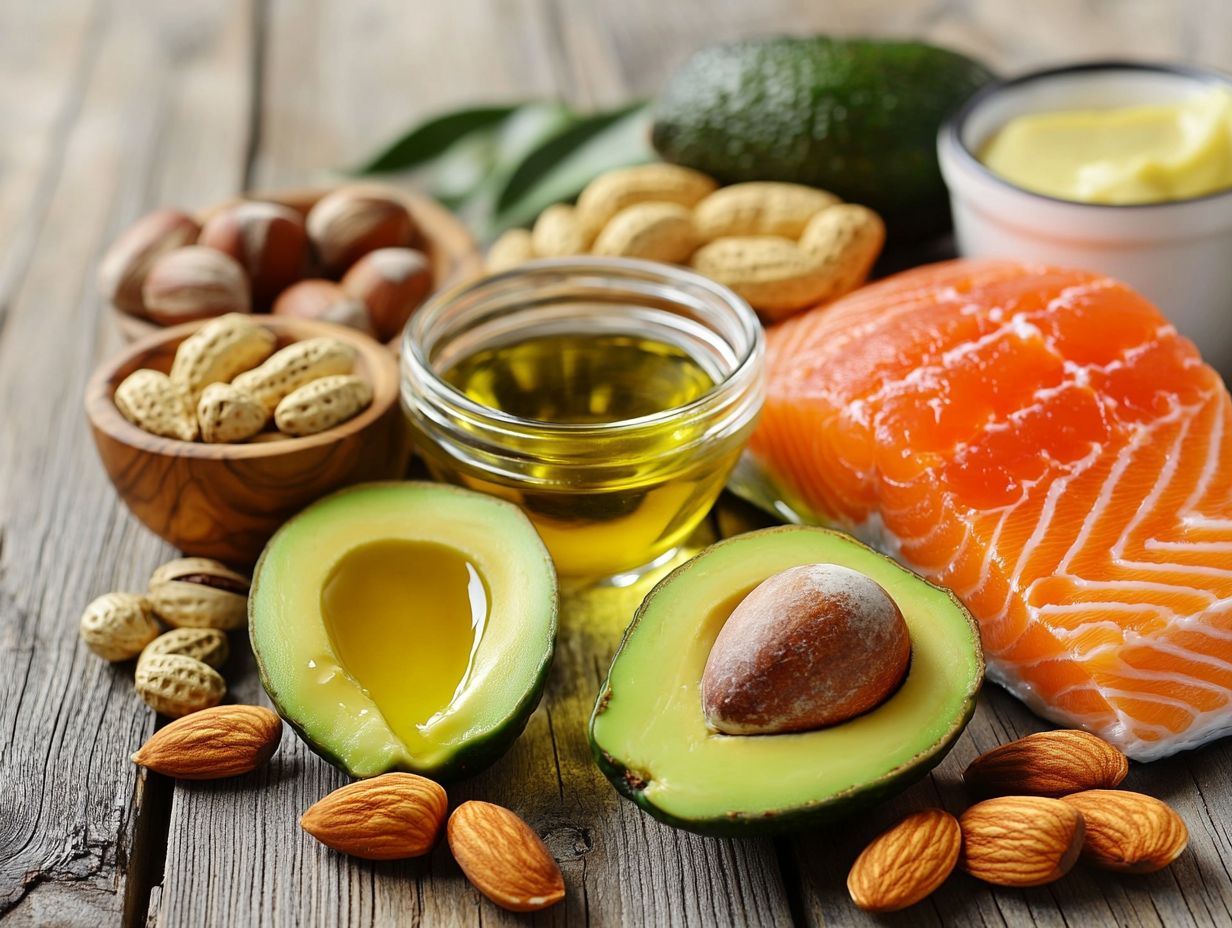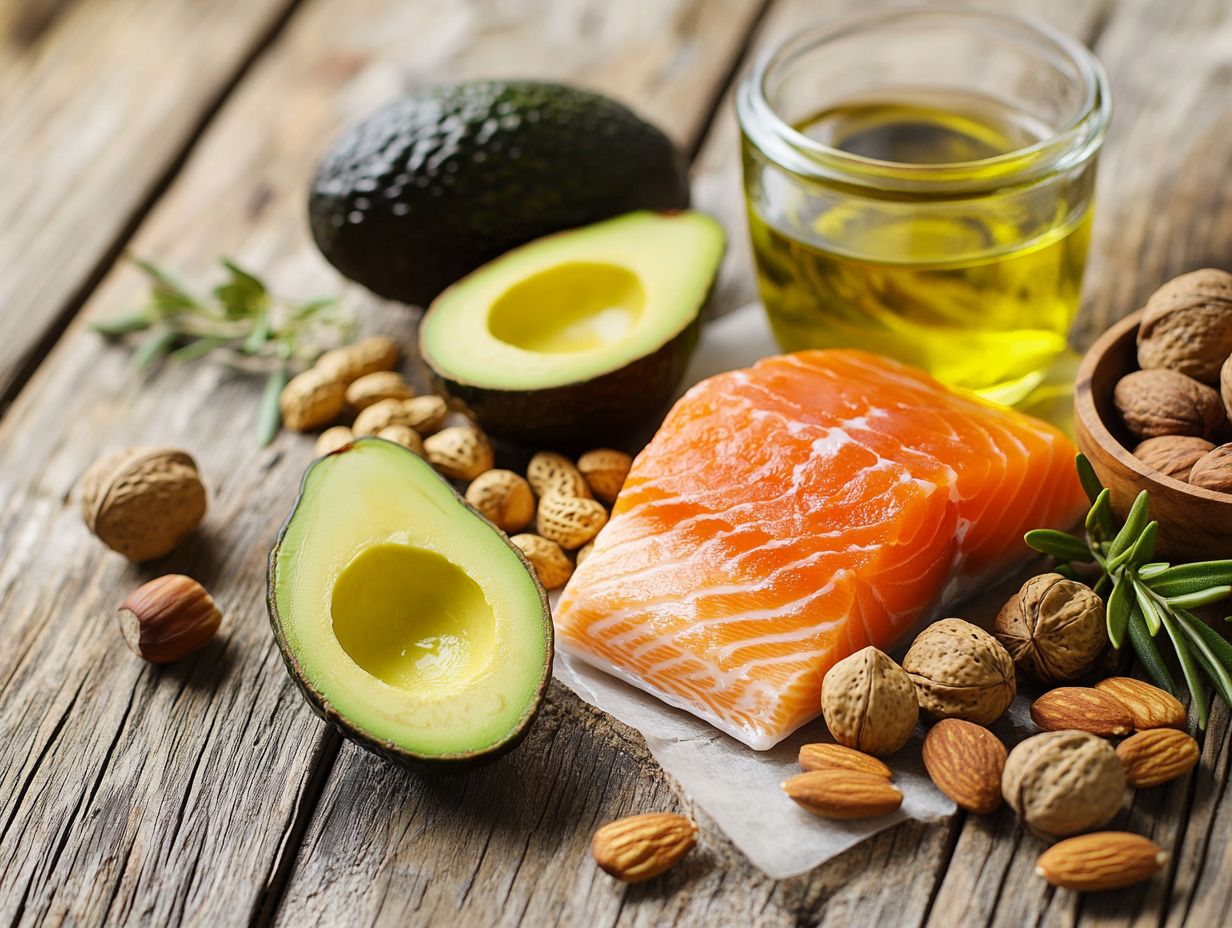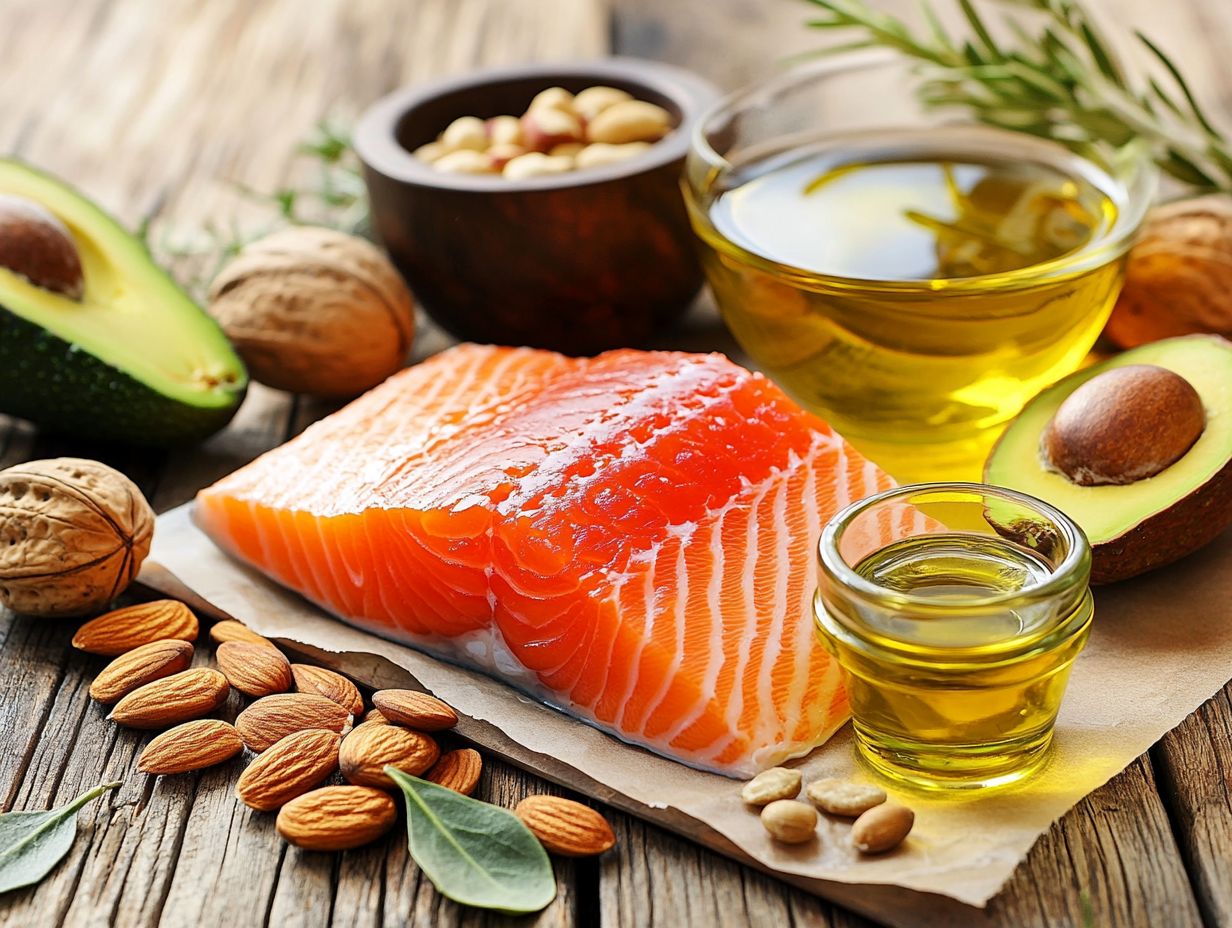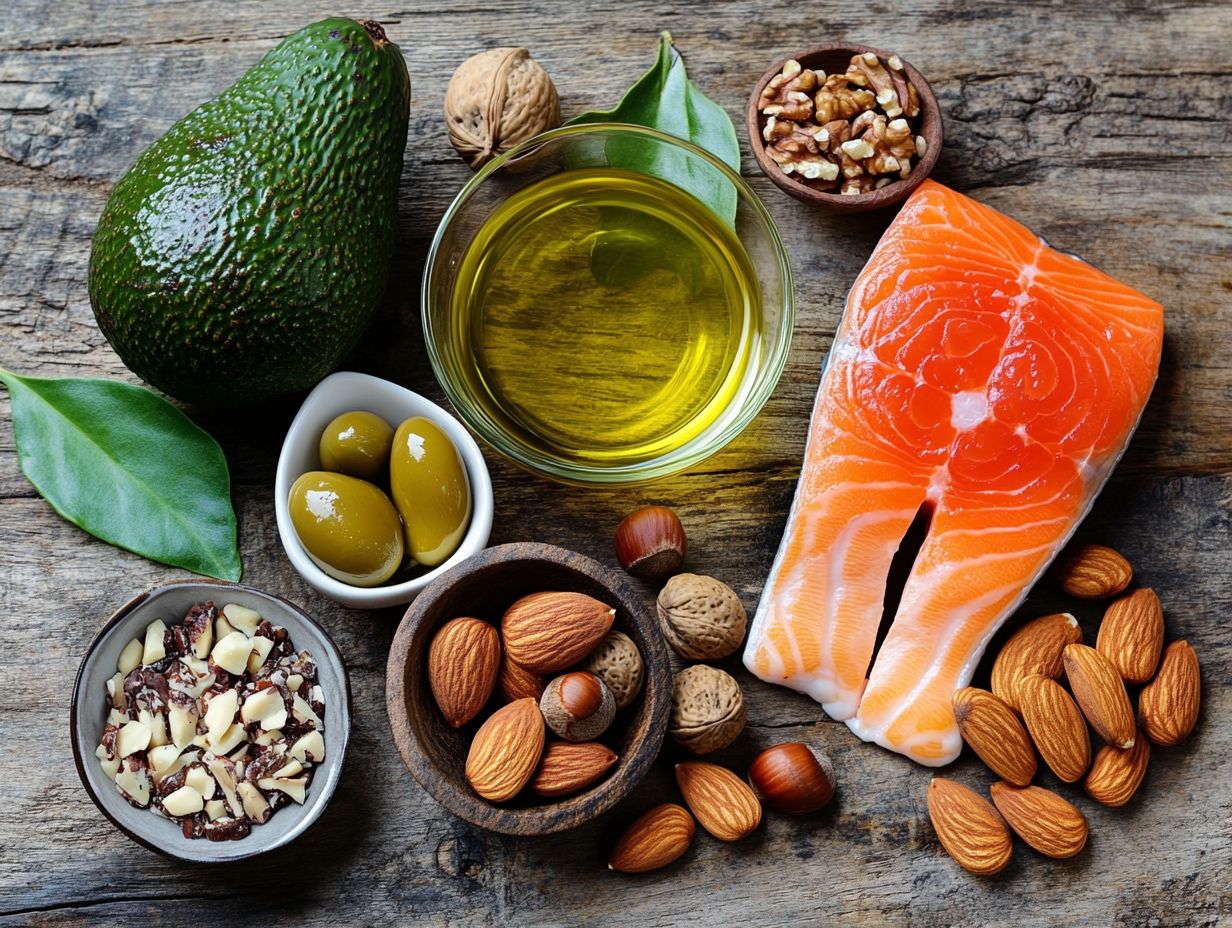5 Common Misconceptions About Fats
Navigating dietary fats can feel like a maze. Myths and misconceptions make it even harder.
Many people believe all fats are bad for health. Some choose low-fat products thinking they are the best option. This article dives into five common myths about fats and reveals the truths behind them.
You ll learn about different fat types, their health benefits, and how to add healthy fats to your meals. Let s clear up these myths and empower your food choices!
Contents
Key Takeaways:

Not all fats are bad for you; healthy fats provide essential nutrients and can improve heart health.
Low-fat or fat-free products are not always healthier options; they often contain added sugars and chemicals.
Eating fat does not necessarily lead to weight gain; the key is to consume healthy fats in moderation along with a balanced diet and exercise. Additionally, it’s important to be aware of common misconceptions about sugar, such as those discussed in 5 myths about sugar you should stop believing.
1. All Fats Are Bad for You
The idea that all fats are harmful is a widespread myth that oversimplifies the important role fats play in health, especially regarding heart disease and cholesterol levels.
Saturated fats can raise bad cholesterol that can lead to heart disease. These are typically found in animal products and certain tropical oils. However, unsaturated fats such as monounsaturated and polyunsaturated fats can lower harmful cholesterol and reduce your risk of cardiovascular issues.
This distinction is crucial. The American Heart Association recommends swapping saturated fats for unsaturated ones whenever possible.
Trans fats, which are often found in processed foods, are particularly harmful. They raise bad cholesterol while lowering good cholesterol, creating a double threat to heart health.
Incorporating healthy fats into your diet is vital for balance. Options like fatty fish, seeds, and olives not only enhance meals but also bring a host of health benefits.
2. Low-Fat or Fat-Free Products Are Always Healthier Options
Many believe that low-fat or fat-free products are healthier. However, this can overlook the nutritional value of fats and the hidden dangers of processed alternatives, as highlighted in 5 misconceptions about nutrition for athletes.
Low-fat options often contain added sugars or artificial ingredients to improve flavor, which can negate any health benefits. Instead of providing nourishment, these products can lead to increased cravings and unsatisfying meals.
Nutritionists recommend whole foods like avocados, nuts, and olive oil. These options offer essential nutrients that support overall health and promote fullness without the complications of processing.
Wellness coaches emphasize ingredient quality over marketing claims. They encourage prioritizing whole, unprocessed foods for long-term well-being and energy.
3. Eating Fat Will Make You Fat
Believing that eating fat leads to weight gain is a common myth that often overlooks the complexities of calorie consumption and fat types. For instance, understanding the 5 common myths about fiber can further clarify misconceptions related to diet and health.
When chosen wisely, certain fats can actually help with weight loss. Including healthy fats can be key to maintaining a balanced diet.
For instance, fats from avocados, nuts, and omega-3s in fatty fish not only enhance meal flavor but also promote fullness. This satiety helps maintain overall caloric balance, allowing you to enjoy meals while managing your weight.
Conversely, indulging in trans fats and excessive saturated fats can harm both health and weight. Understanding this distinction is essential for anyone focused on long-term wellness.
4. All Saturated Fats Are Bad for Your Heart

While many believe that all saturated fats are bad for heart health, emerging research reveals a more nuanced relationship between saturated fats, LDL cholesterol (often referred to as “bad cholesterol”), and overall cardiovascular risk than previously understood.
Recent studies show that certain sources of saturated fats, like those in coconut oil and dairy products, might not carry the same negative consequences for heart health as once thought.
In fact, rather than promoting inflammation, these fats can offer exciting health perks when enjoyed in moderation!
Understanding how these foods fit into your diet is key. For example, by incorporating a variety of nutrient-dense foods alongside these fats, you can help maintain optimal cholesterol levels and support your cardiovascular health.
Being mindful of portion sizes and the frequency of consumption is crucial to achieving a balanced diet that truly benefits your heart.
5. Not All Unsaturated Fats Are Good for You
While unsaturated fats, such as monounsaturated and polyunsaturated fats, are often celebrated as heart-healthy choices, it’s important to recognize that not all unsaturated fats are equal. Understanding the distinctions among them is vital for optimizing your heart health and overall nutrition.
Monounsaturated fats, prominently found in olive oil, avocados, and certain nuts, play a significant role in lowering bad cholesterol levels and enhancing cardiovascular well-being.
On the other hand, polyunsaturated fats, which include omega-3 and omega-6 fatty acids, primarily come from sources like fatty fish, flaxseeds, and walnuts. Both varieties are essential for reducing inflammation and supporting your heart’s health.
To seamlessly incorporate these beneficial fats into your daily meals, consider these simple strategies:
- Drizzle olive oil on your salads for a flavorful boost.
- Add a serving of fatty fish to your weekly menu for a heart-friendly option.
- Snack on a handful of nuts to satisfy cravings while nourishing your body.
Even small adjustments can lead to significant improvements in your health.
What Are the Different Types of Fats?
Understanding the various types of fats saturated, unsaturated, and trans is essential for making informed dietary choices that foster heart health and overall well-being. Each type possesses distinct nutritional properties and health implications that you should be aware of.
Saturated fats, often found in animal products like red meat and full-fat dairy, can contribute to elevated cholesterol levels when consumed in excess.
Conversely, unsaturated fats, prevalent in sources such as olive oil, avocados, and nuts, are celebrated for their heart-healthy benefits and ability to reduce bad cholesterol.
Essential fatty acids, like omega-3 and omega-6, are fats that your body cannot produce on its own, making them crucial for brain function and overall cell health. On the flip side, trans fats, which often lurk in processed foods, are linked to an increased risk of heart disease and should definitely be avoided.
Thus, embracing a diverse intake of these fats is vital for achieving balanced nutrition and optimal health.
What Are the Health Benefits of Including Healthy Fats in Your Diet?
Incorporating healthy fats into your diet offers a wealth of benefits, from enhancing heart health to improving cholesterol levels and reducing inflammation. These fats are essential for a balanced diet.
Research reveals that omega-3 fatty acids, abundant in fatty fish like salmon and walnuts, play a significant role in lowering triglycerides while boosting HDL (the good cholesterol).
These healthy fats actively combat inflammation, which is a major contributor to chronic diseases such as heart disease and arthritis.
To fully embrace these benefits, consider:
- Adding avocados to your morning smoothie.
- Using olive oil as a flavorful salad dressing.
- Drizzling it over roasted vegetables.
Snacking on mixed nuts can also satisfy your cravings while elevating your nutrient intake.
Start incorporating these healthy fats today for a better tomorrow!
What Are the Potential Risks of Consuming Too Much Fat?

Healthy fats are beneficial. However, consuming too much can lead to weight gain and high cholesterol.
Overdoing saturated and trans fats doesn t just lead to significant weight gain; it can also increase your risk of heart disease and other chronic health issues. Regularly indulging in foods high in these unhealthy fats can throw your diet out of balance.
To navigate these risks, set clear guidelines for fat consumption. Aim to limit saturated fat to less than 10% of your total daily calories.
Reading nutrition labels helps you make informed choices, striking a perfect balance while enjoying healthier options without sacrificing flavor.
How Can You Incorporate Healthy Fats into Your Diet?
Incorporating healthy fats is easy and a delicious journey! You ll discover countless exciting options at your fingertips, like avocados, olive oil, and nuts.
Explore cooking techniques such as saut ing, roasting, and blending to elevate your meals while preserving nutritional benefits. For instance, roasting vegetables with olive oil retains their vitamins and infuses them with rich flavor.
Consider crafting a creamy avocado dressing for salads or grain bowls, adding a delightful twist to your meals. Mixing nuts into your morning oatmeal or yogurt can transform breakfast into a heart-healthy choice.
What Are Some Common Sources of Healthy Fats?
Common sources of healthy fats include fatty fish, nuts, seeds, avocados, and high-quality vegetable oils. These foods are rich in essential nutrients that enhance your overall health.
Fatty fish like salmon are packed with protein and antioxidants, while avocados offer a creamy texture along with fiber and potassium.
Nuts and seeds are incredibly versatile; they can be sprinkled onto salads or blended into smoothies, adding satisfying crunch and nutritional boosts.
Incorporating these healthy fats into a Mediterranean diet elevates meal quality, making them both satisfying and heart-friendly.
What Are Some Tips for Choosing Healthy Fats?
Choosing healthy fats requires an eye for nutritional labels, an emphasis on whole food sources, and adherence to guidelines that prioritize heart health.
Incorporating these fats can transform your health, allowing you to savor delightful flavors while nourishing your body. Examine labels for trans fats, as these unhealthy fats can adversely affect cholesterol levels.
Opt for unprocessed options like avocados, nuts, and olive oil, which provide essential fatty acids without added sugars or preservatives. Keep portion sizes in mind; even the healthiest fats can lead to weight gain if indulged in too much.
When cooking, explore roasting or grilling instead of frying, ensuring every choice contributes positively to your health journey.
Frequently Asked Questions

What are some common misconceptions about fats?
Common misconceptions include that all fats are unhealthy, that cutting out all fats is key to weight loss, and that all fats contribute to heart disease.
Is it true that all fats are bad for you?
No, not all fats are bad. Some types, like monounsaturated and polyunsaturated fats, are necessary for our bodies and considered healthy.
Can avoiding all fats help with weight loss?
No, cutting out all fats is not the answer to weight loss. Our bodies need healthy fats to function well.
A balanced diet is crucial for overall health and effective weight management.
Do all fats contribute to heart disease?
No, not all fats contribute to heart disease. Only trans fats, often found in processed and fried foods, are linked to heart issues.
It’s important to limit these harmful fats and focus on healthy alternatives.
Are all fats created equal?
No, fats vary in healthiness. Saturated and trans fats are unhealthy and should be minimized.
In contrast, unsaturated fats found in avocados, nuts, and olive oil are healthy and beneficial.
Is it necessary to completely eliminate fats from my diet?
No, you don t need to eliminate fats entirely. They are essential for a balanced diet.
Cutting out fats can harm your health. Focus on enjoying healthy fats in moderation.






